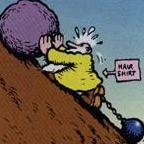Hard Sarge
Posts: 22741
Joined: 10/1/2000
From: garfield hts ohio usa
Status: offline

|
When IJN came back in force around Christmas, they squashed Wake,
I wouldn't say they Squashed them, the US Naval Commander, didn't think things were going too good, so ordered the surrender, against the advice of the Marine ground commander, after the surrender, the Marine commander had to go around and tell his boys to stop killing the Japs, as they had given up
now to be honest, don't think they could of held out much longer, but the Japs would of had to bring in more troops to do so if they had, or pulled back and let the supplies run out
that battle was a large slap in the face for the Jap high command
for Midway, some of the reports released back home were about how they had decoyed the Allies there to get the landings in the Alutions (spelling) to succeed, wounded Naval personal, that were sent back home to the home islands, were not allowed out of the Hosp or allowed to be seen by anybody not in the service
for Leyte Gulf, what was even worse, the commanders on the islands, were reporting back to the Fleet, how great the battle was going, how many ships had been sunk, and the large amount of planes that had landed and would be turned around to make the 2nd strike (the shame of that battle is the fact that it was a well thought out action, very good thinking in it, only the people in charge didn't let the true info out to those that needed it, the CV fleet was charging in the 2nd day to finish off the remains of the US Fleet, only to find out that there were not plane (not many) to complete the battle)
HARD_Sarge
_____________________________
|
 Printable Version
Printable Version
















 New Messages
New Messages No New Messages
No New Messages Hot Topic w/ New Messages
Hot Topic w/ New Messages Hot Topic w/o New Messages
Hot Topic w/o New Messages Locked w/ New Messages
Locked w/ New Messages Locked w/o New Messages
Locked w/o New Messages Post New Thread
Post New Thread